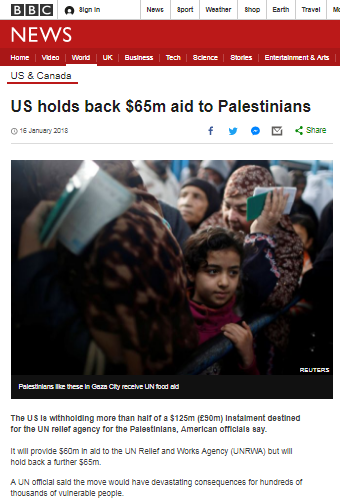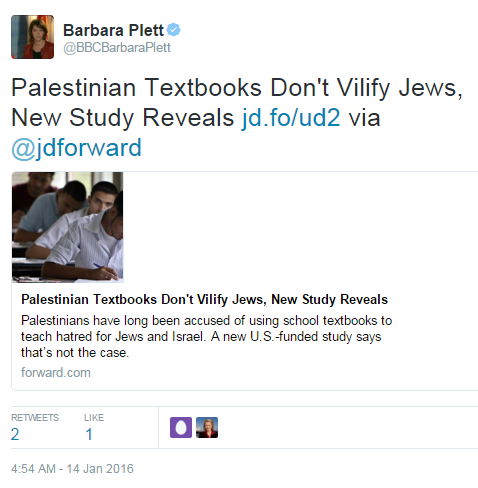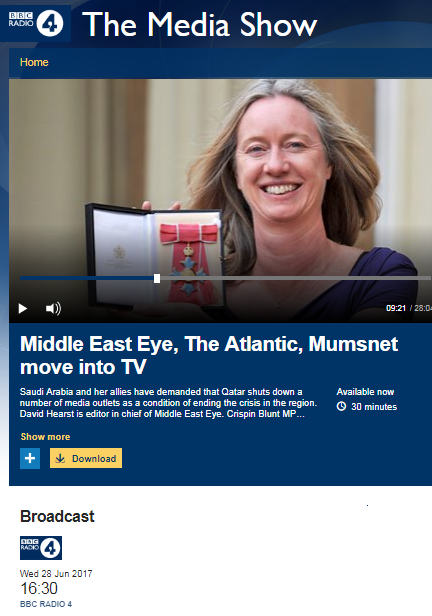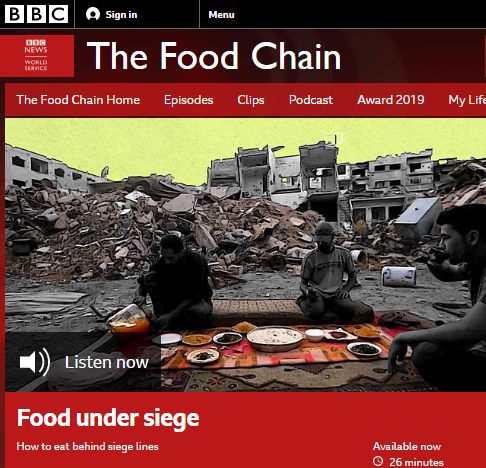On January 16th the BBC News website published a report headlined “US holds back $65m aid to Palestinians” on its ‘US & Canada’ and ‘Middle East’ pages. Readers were told that:
“The US is withholding more than half of a $125m (£90m) instalment destined for the UN relief agency for the Palestinians, American officials say.
It will provide $60m in aid to the UN Relief and Works Agency (UNRWA) but will hold back a further $65m. […]
The US funds almost 30% of the UN agency’s work overall and gave $370m to UNRWA last year. The money withheld is part of this year’s first instalment.”
Later on in the report more details on funding were provided under the sub-heading “How much aid does the US send to Palestinians?” – with the BBC finding it necessary to inform readers that:
“By contrast, Israel receives more than $3bn in military aid per year from the US.”
The BBC did not bother to clarify that the vast majority of that different kind of aid is conditioned on it being spent on American defence contractors.
Readers also found the following:
“”This is not aimed at punishing” anyone, state department spokeswoman Heather Nauert told reporters, adding that it was due to a US desire to see reforms at the agency.
The $65m is being withheld “for future consideration”, a US official told Reuters news agency, speaking on condition of anonymity.
“It is time other countries, some of them quite wealthy, step in and do their part to advance regional security and stability,” the official added.”
BBC Audiences were not told what such “reforms” might entail although, according to a report in Ha’aretz, Ms Nauert did clarify that point in her remarks.
‘”This is not aimed at punishing anyone,” Nauert said during her daily press briefing. “The United States Government and the Trump administration believe that there should be more so-called burden sharing to go around,” she added.
According to Nauert’s explanation, “the United States has been, in the past, the largest single donor to UNRWA. We would like other countries – in fact, other countries that criticize the United States for what they believe to be our position vis-a-vis the Palestinians, other countries that have criticized us – to step forward and actually help with UNRWA, to do more.” Nauert compared the decision regarding UNRWA to the Trump administration’s push for members of NATO to increase their defense spending: “Just as we have with NATO, asking other countries to provide that 2 percent GDP into its defense, we are asking countries to do more as it pertains to UNRWA.”‘
Under the sub-heading “What is Israel’s position?” readers were told that:
“Its ambassador to the UN, Danny Danon, called for aid to UNRWA to be scrapped completely.
He accused the agency of misusing humanitarian aid and supporting “anti-Israel propaganda”.
“It is time for this absurdity to end and for humanitarian funds to be directed towards their intended purpose – the welfare of refugees,” he said.”
According to a report in the Jerusalem Post, Mr Danon’s statement included additional points which the BBC apparently chose to edit out.
‘“UNRWA has proven time and again to be an agency that misuses the humanitarian aid of the international community and instead supports anti-Israel propaganda, perpetuates the plight of Palestinian refugees and encourages hate,” he said.
“Just over the last year alone, UNRWA officials were elected to the leadership of Hamas in the Gaza Strip, UNRWA schools denied the existence of Israel, and terror tunnels were dug under UNRWA facilities. It is time for this absurdity to end and for humanitarian funds to be directed toward their intended purpose – the welfare of refugees,” Danon added.’
As readers may recall, the BBC did not report on the UNRWA employees who were elected to the Hamas political bureau. Stories about Hamas tunnels dug underneath UNRWA schools have also been ignored – as have those concerning antisemitic incitement posted on social media by UNRWA employees and political campaigning by a senior official at UNRWA.
The BBC does not have an online profile for UNRWA but a profile of the United Nations published in 2011 gives descriptions of the two UN agencies dealing with refugees:
“UN High Commissioner for Refugees (UNHCR) – safeguards rights and well-being of refugees; based in Geneva
UN Works and Relief Agency (UNWRA) [sic] – dedicated agency providing assistance solely to Palestinian refugees and their descendants”
Readers of this article (and many previous BBC reports) were not provided with relevant background information such as the fact that UNRWA employs 30,000 members of staff to take care of 5.3 million registered clients while the UNHCR has fewer than 11,000 staff dealing with 17.2 million refugees in 130 countries. Audiences were not informed that the number of Palestinians classified as refugees by UNRWA rose from 750 thousand in 1950 to five million in 2013 due to that organisation’s unique policy of automatically awarding hereditary refugee status.
Readers were not told why refugee camps still exist in areas under the control of the Palestinian Authority or Hamas or why Palestinians with Jordanian citizenship are still classified as refugees. Neither were they informed of the fact that while the UNHCR is “mandated by its Statute and the UN General Assembly Resolutions to undertake resettlement” of refugees, no such mandate currently applies to UNRWA.
While that relevant background was withheld, the BBC’s article did amplify reactions from former UN official Jan Egeland and the PLO.
“The withdrawal of funds would, he [Egeland] said, have “devastating consequences for vulnerable Palestinian refugees across the Middle East, including hundreds of thousands of refugee children in the West Bank and Gaza, Lebanon, Jordan and Syria who depend on the agency for their education”.
It would also “deny their parents a social safety net that helps them to survive, and undermine the UN agency’s ability to respond in the event of another flare up in the conflict”.
The Palestine Liberation Organization, an umbrella group for Palestinian factions, tweeted that the Trump administration seemed to be following an Israeli policy of dismantling “the one agency that was established by the international community to protect the rights of the Palestinian refugees”.”
Obviously BBC audiences cannot reach informed opinions on this particular story so long as the BBC continues to refrain from providing them with the relevant background concerning the long-standing debate surrounding UNRWA that they have been denied for so many years.
Related Articles:
BBC WS listeners get a homogeneous view of US aid to Palestinians – part one
BBC WS listeners get a homogeneous view of US aid to Palestinians – part two
Unravelling years of BBC statistics on Palestinian refugees in Lebanon
BBC self-conscripts to UNRWA PR campaign
BBC World Service amplifies UNRWA’s political campaigning yet again




